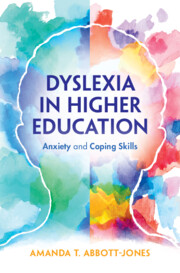Book contents
- Dyslexia in Higher Education
- Dyslexia in Higher Education
- Copyright page
- Contents
- List of Figures
- Preface
- Chapter 1 Introductory Chapter
- Chapter 2 Dyslexia, Anxiety and Social/Emotional Barriers in Higher Education
- Chapter 3 Theories of Anxiety and Coping
- Chapter 4 Identification of the Prevalence of Anxiety
- Chapter 5 Effects of Dyslexia and Emotional Responses to Academic Tasks
- Chapter 6 Cognitive Techniques to Overcome Barriers to Learning
- Chapter 7 Emotional Techniques to Overcome Barriers to Learning
- Chapter 8 Theoretical Insights into Dyslexic Anxiety and Coping Responses
- Chapter 9 Concluding Thoughts and Moving Forwards
- Book part
- Index
- References
Chapter 6 - Cognitive Techniques to Overcome Barriers to Learning
Published online by Cambridge University Press: 21 October 2021
- Dyslexia in Higher Education
- Dyslexia in Higher Education
- Copyright page
- Contents
- List of Figures
- Preface
- Chapter 1 Introductory Chapter
- Chapter 2 Dyslexia, Anxiety and Social/Emotional Barriers in Higher Education
- Chapter 3 Theories of Anxiety and Coping
- Chapter 4 Identification of the Prevalence of Anxiety
- Chapter 5 Effects of Dyslexia and Emotional Responses to Academic Tasks
- Chapter 6 Cognitive Techniques to Overcome Barriers to Learning
- Chapter 7 Emotional Techniques to Overcome Barriers to Learning
- Chapter 8 Theoretical Insights into Dyslexic Anxiety and Coping Responses
- Chapter 9 Concluding Thoughts and Moving Forwards
- Book part
- Index
- References
Summary
This chapter provides space for students with dyslexia to talk about the innovative methods that they employ for the purposes of cognitively coping with academic learning tasks. As such, the chapter offers an array of cognitive coping strategies that students say they are applying to deal with negative emotion derived from cognitive difficulties, such as time constraints, retention and retrieval difficulties, and processing difficulties. The range of study tasks required by all university courses, such as reading, remembering reading, spelling, taking exams, producing written work and writing essays, giving presentations, using organization skills, meeting deadlines, taking notes in lectures, and contributing to seminar discussions, is presented, and student articulations in relation to cognitive techniques that they apply to overcome barriers with the tasks are provided. The chapter makes it clear that dyslexic learners at university level have progressed to this stage of education due to their resourcefulness and knowledge of types of learning strategies suitable for their own individual learning styles. The learning strategies to tackle each academic task are presented under six key themes: unique cognitive learning strategies; use of specialist technology; multisensory ways of learning; practical things; alleviating scotopic sensitivity; and use of favourite materials.
Keywords
- Type
- Chapter
- Information
- Dyslexia in Higher EducationAnxiety and Coping Skills, pp. 195 - 231Publisher: Cambridge University PressPrint publication year: 2021

